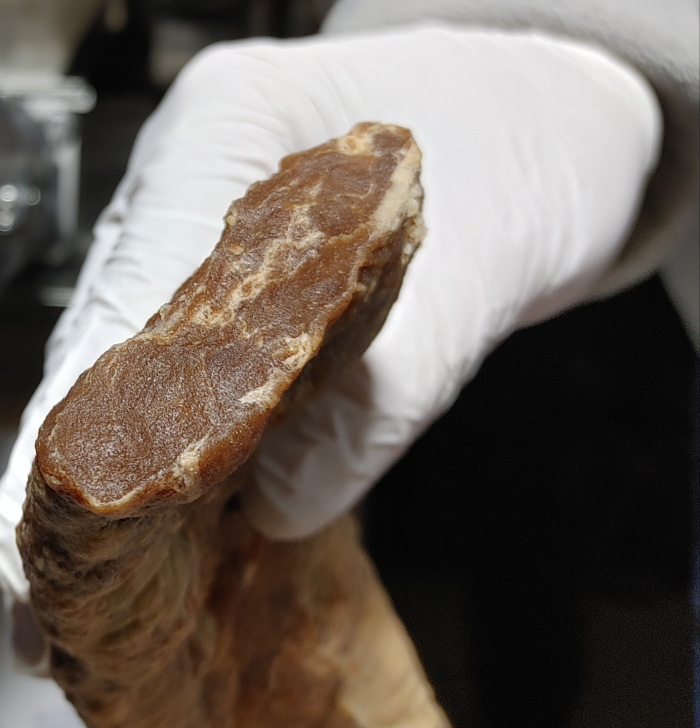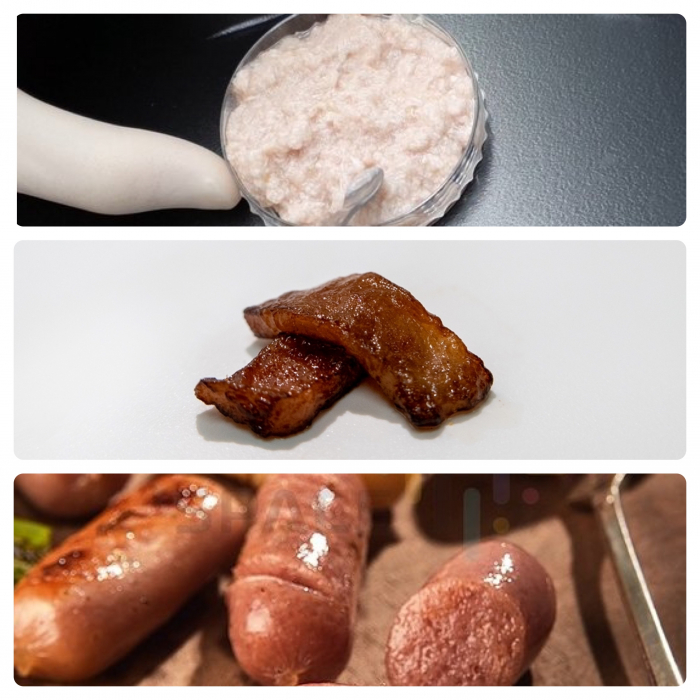Korean startups
South Korea’s alternative meat startups get VCs salivating
While plant-based meat substitutes dominate the market today, experts expect demand for lab-grown meat to catch up soon
By Jul 14, 2022 (Gmt+09:00)
7
Min read
Most Read
LG Chem to sell water filter business to Glenwood PE for $692 million


Kyobo Life poised to buy Japan’s SBI Group-owned savings bank


KT&G eyes overseas M&A after rejecting activist fund's offer


StockX in merger talks with Naver’s online reseller Kream


Mirae Asset to be named Korea Post’s core real estate fund operator



In South Korea, the list of early stage startups that garnered more than 5 billion won ($3.8 million) in the last 12 months looks slightly different than it did in the past years.
For the first time, startups in the “clean meat” business are on the roster alongside the perennial infotech startups.
Cases in point are DaNAgreen, Space F and Innohas, to name a few.
These startups are either developing plant-based meat substitutes or cultured meat.
Cultured meat, also known as cultivated meat, is genuine animal meat produced by directly cultivating animal cells.
As the production method eliminates the need to raise and farm animals for food, thereby removing cruelty, the end product is often referred to as clean meat.
Whereas domestic clean meat startups did not get much traction from institutional investors in the past, that has begun to change in the last couple of years.
When the Singapore Food Agency (SFA) approved the sale of a lab-grown meat product in late 2020, the decision had ripple effects in South Korea.
Since then, venture capital firms have been on the lookout for clean meat producers.
South Korean F&B giants such as CJ CheilJedang Corp., Daesang Corp., and ChungJungOne have signed a string of agreements with biotech startups to get in on the business.
The war on Ukraine and Net Zero concerns have also made for a strong case for alternative meat.
CULTURED OVER BUTCHERED
Meat substitutes can be either plant or animal-based – and the former is currently more prominent.
Zikooin Company produces vegan meat from upcycled grains, oats and rice that otherwise would be thrown away for aesthetic reasons.
The Seoul-based startup was the country’s first to provide plant-based ingredients to fast food restaurants, namely Subway and Domino’s Pizza Inc., with its UNLIMEAT product.
Another Seoul-based plant-based meat startup Viomix Tech completed a financing round last September and raised 20 billion won ($15 million) from Kiwoom Private Equity, Kiwoom Investment, and more.
The amount was the largest domestic investment so far into an alternative meat developer.
The cultured meat sector is quickly catching up to plant-based meat.
In-vitro meat is a novel concept in food biotechnology, which encompasses the field of tissue engineering and cellular agriculture.
It involves the production of edible biomass by an in-vitro culture of stem cells harvested from the muscle of live animals by self-organizing or scaffolding methodology.
The market for plant-based meat is at the stage of rapid commercialization; while that of lab-grown meat remains – well, at the labs.
The nascent development phase has not deterred investors as the in-vitro methods mimic fresh meat more closely than alternative products made of protein-rich beans, insects, and more.
Global management consulting firm Kearney forecasts the lab-grown meat industry to be worth about $450 billion by 2040 to take up about 35% of the total meat market.
In other words, more than a third of meat consumption around the globe will be from cultured meat in 20 years.
Hanwha Solutions Corp., Lotte Corp., CJ CheilJedang, Daesang Corp., and more have formed funds to invest in alternative meat development or to acquire stakes in the startups that are in the business of doing so.
As part of the Hanwha Group’s climate tech initiative, the petrochemical subsidiary invested in the US biotech company Finless Foods, which develops cultured fish, and the Korean startup DaNAgreen.
“Cultured meat is effective in reducing carbon emissions and the market has high growth potential,” a Hanwha Solutions employee said.
Other South Korea's F&B conglomerates poured capital into two main categories: the development of alternative meat and the establishment of all-vegan restaurants.
R&D
In 2020, DaNAgreen became the first country in South Korea to do a tasting test for cultured meat.
Founded in 2017, the startup crosslinks proteins to develop a proprietary scaffold that helps cells grow into a three-dimensional structure for biomedical applications. Its initial scaffolding is called Protinet.
CEO Kim Ki-woo said the company is in the process of setting up a Singapore office for overseas expansion.
“Our goal is to drastically reduce the price of meat from the current 1.5 million won a kilogram to around 30,000 won a kilogram as early as 2024,” said Kim.

Seawith uses low-iodine brown-algae seaweed, commonly called kelp, as a culture medium for producing lab-grown meat, particularly Hanwoo.
Established in 2019, the company aims to tackle one of the biggest challenges facing the alternative meat market, which is the high cost of growth media.
“We are setting ourselves apart from our competitors by cutting down the production cost with the use of microalgae as a growth medium,” an employee with Seawith explained.
Earlier this year, Space F hosted a tasting event for its cultivated pork prototype.
The startup is working with conglomerates Daesang and Lotte on product development, which also encompasses cultured sausages, hamburger patties and chicken nuggets.
WHOLE-CUT
Cultured meat developers are facing the common challenges of finding ways to mass produce while cutting down the cost.
But another task unique to the sector is the race to manufacture whole-cut meat.
Due to technical difficulty, most alternative meat, both plant-based and cultured, comes in the form of ground meat.
“It is extremely hard to produce whole-cut meat because when a cell grows to a certain size, it can no longer absorb oxygen,” an expert explained to The Korea Economic Daily. “The ultimate test for the level of cultivation technology will be on whether a lab can produce whole cuts of meat.”
TissenBioFarm and Pensées Inc. possess the highly coveted technology.
TissenBioFarm can produce meat that has the texture and marbling of whole-cut meat while Pensées uses bioprinting technology.
“We will host a tasting event in mid-August and pursue proper commercialization after that,” CEO and founder of Pensées Lee Sung-jun said.

FOOD SECURITY
Out of approximately 100 cultivated meat companies around the globe, Eat Just, Inc. is the only one that sells its product in the retail market.
The San Francisco-based startup develops and markets plant-based alternatives to conventionally produced egg products and cultivated meat products.
In late January, LG Group announced its plans to invest 25 billion won ($21 million) in the food-tech startup.
In December 2020, Singapore’s Food Agency announced it had approved an Eat Just product for sale as an ingredient in chicken nuggets.
Following the historic moment, other biotech companies have also received the green light from the Singaporean authority for the sale of their lab-grown meat.
Like Singapore, countries that heavily rely on imports for foodstuffs are bullish on alternative meat development.
Israel and the United Arab Emirates are prime examples of such nations where food security amidst climate change and the rising price of crops have become a high priority for regulators.
In South Korea, plant-based meat is approved for sale. Cultured meat, on the other hand, is not allowed to be sold, as relevant laws and food licensing have not yet been established.
The Ministry of Food and Drug Safety is currently discussing the safety standards and licensing systems for lab-grown meat.
Despite the livestock industry’s vehement lobbying against the alternative meat industry, widespread investor sentiment is that the rise of the latter is a fait accompli.
Millennials and Gen Z’s show a strong preference for value-based consumption, which could lead to a negative impact on factory farming that harms the environment, animals, and ultimately humans.
“Even though the technology will not be universally adopted in the near term, investors are betting that it becomes a main source of future provisioning,” June Cha, partner at Seoul-based venture capital firm Envisioning Partners said.
Cha elaborated: “It is more than a matter of eating meat or being a vegetarian. The technology can be a sustainable solution to a lot of the problems we all face, such as carbon emissions and resource waste that is inevitable with factory farming.”
Write to Da Eun Choi at max@hankyung.com
Jee Abbey Lee edited this article.
More to Read
-
 Food & BeverageOttogi launches vegan tuna on rising demand for plant-based alternatives
Food & BeverageOttogi launches vegan tuna on rising demand for plant-based alternativesJun 17, 2022 (Gmt+09:00)
2 Min read -

-
 Korean startupsStartups serving specific markets thrive: SaaS, fantech, veganism
Korean startupsStartups serving specific markets thrive: SaaS, fantech, veganismJun 01, 2022 (Gmt+09:00)
4 Min read
Comment 0
LOG IN


